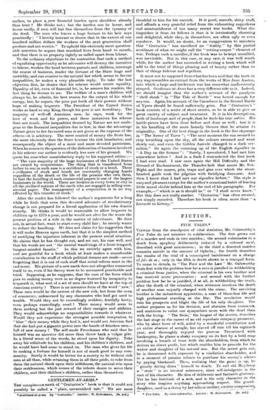GENTLEMEN-AT-ARMS.•
THE conspicuous merit of "Centurion's" book is that it could not possibly be called a " plain, unvarnished tale." We are most
• Castlemen-afeinse By "Centurion." London: W. Heinemann. [es. net) thankful to him for his varnish. It is good, smooth, shiny stuff, and affords a very grateful relief from the exhausting ruggedness and amateurishness of too many recent war books. What dis- tinguishes it from its fellows is that it is intrinsically charming and delightful, while they, in themselves, are often ugly or even repulsive. It would, no doubt, be an exaggeration to maintain that " Centurion " has sacrificed no " reality " by this partial avoidance of what we might call the " rotting-corpse " element of war. Perhaps such a sacrifice, if the book was to be kept unsullied, was inevitable. But in this case, at any rate, it was well worth while, for the author has succeeded in writing a book which will add to the total of things pleasing and of beauty rather than to that of things hideous and repellent.
It must not bs supposed from what has been said that the book in any way resembles an extract from the works of Miss Jane Austen, into which a large and irrelevant war has somewhat inadvertently strayed. Gentlemen-at-Arms has a very different side to it. Indeed, we should imagine that the author's account of the paralytic " shell shock " in " The Tide of Battle " was horrid enough for anyone. Again, his account of the Canadians in the Second Battle of Ypres should be found sufficiently grim. But " Centurion's " book consists of a series of short stories, so he is able to give us great variety of subject and treatment. It is in his descriptions, both of landscape and of people, that he finds his true metier. His battle-pieces have been done before and done as well ; but it is in his handling of the more homely themes that he attains to originality. One of tho best things in the book is the fine skyseape in"The Sower of Tares ": "The next moment the sun seemed to stop breathing upon the sky, all the colours swooned and went slowly out, and even the Golden Aureole changed to a dark ver- milion." Or again the summing up of the English signaller in " A Day on the Somme " " Surely, I speculated, I had met him somewhere before ? And in a flash I remembered the first book I had ever read. I saw once again the Hill Difficulty and the Ground of Enchantment, the Thunder-bolt that smote Mr. Not- Right and the snares, pits, traps and gins over which the stout- hearted guide took the pilgrims with fortifying discourse. And then I knew that I had met our signaller before." The style is easyand pleasant except for the author's occasional habit of leaving little moral clichis behind him at the end of his paragraphs. For example,—" which is as it should be" or "I shall never know." But this does not really matter. "Centurion" has often created, not simply recorded. Therefore his book is often more than " a footnote to history."


























 Previous page
Previous page